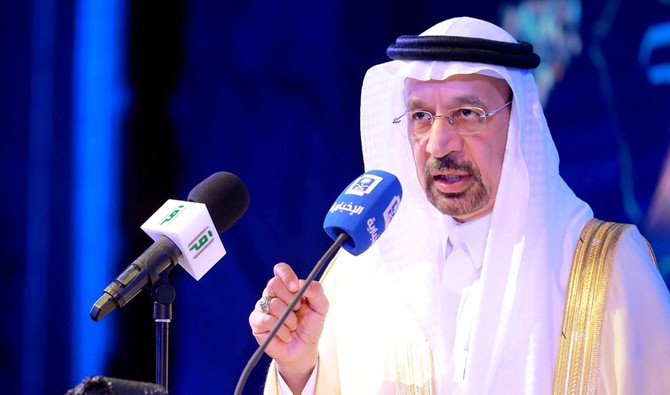KSA suspends oil shipments through Bab Al Mandab after Houthi terror attack

- Houthi terrorists earlier attacked two Saudi giant oil tankers, causing “slight damage” to one oi the vessels
- The Arab Coalition helping Yemen’s legitimate government said the Houthis almost caused an environmental disaster.
JEDDAH: Saudi Arabia has suspended oil shipments through Bab Al-Mandab Strait after Iran-backed Houthi rebels in Yemen attacked two oil tankers, Energy Minister Khalid Al-Falih said on Wednesday.
“All oil shipments passing through Bab Al-Mandab Strait have been suspended temporarily until navigation through the area is secure,” Al-Falih said in a statement released through the Saudi Press Agency (SPA) and state TV Al-Ekhbariyah.
Al-Falih and Saudi Aramco confirmed in statements that two giant oil tankers belonging to the Saudi National Shipping Company, each carrying 2 million barrels of crude oil, were attacked by Houthi terrorists in the Red Sea Wednesday morning after crossing Bab al-Mandab.
“One of the ships sustained minimal damage. No injuries nor oil spill have been reported,” Aramco said.
The oil giant said the decision to suspend shipments was “in the interest of the safety of ships and their crews and to avoid the risk of oil spill.”
Earlier, the pro-Houthi Al-Masirah television said that the rebels had targeted a Saudi warship named Al-Dammam, without providing further details.
But the Arab Coalition supporting the legitimate government of Yemen President Abed Rabbo Mansour Hadi said crude oil tankers were attacked.
Col. Turki Al-Maliki, spokesman of the coalition, said the Houthis “had almost caused an environmental disaster.”
The coalition has repeatedly raised alarm that Houthi rebels threaten vessels in the Red Sea — a key shipping route for world trade — through their control of the strategic Hodeida port.
The Bab Al-Mandab Strait, one of the world’s busiest shipping routes, links the Red Sea and the Gulf of Aden, and the Indian Ocean.
“This terrorist attack is a dangerous threat to the freedom of navigation and international trade in the Red Sea,” said Colonel Al-Malik.
“Port of Hodeida is still the starting point of terrorist attacks,” he said.
Pro-government forces backed up by a coalition led by Saudi Arabia have paused their offensive on Hodeida port in a bid they say to give UN-led peace efforts a chance.
The United Arab Emirates, whose forces in the coalition have been spearheading the Hodeida assault, has warned that troops could “liberate” the port city if those efforts fail.
Saudi Arabia intervened in Yemen in 2015 at the head of a military coalition backing the country’s government after Houthi rebels ousted it from the capital Sanaa the previous year.
Meanwhile, the UN special envoy for Yemen Martin Griffiths arrived Wednesday in the capital, Sanaa to meet with rebel leaders amid efforts to restart peace talks after a two-year hiatus.
Yemeni Prime Minister Ahmed Obaid bin Daghr said Sunday the rebels should release all detainees and captives held in their prisons ahead of peace talks. He said the Houthis should also hand over their arms and withdraw from all rebel-held areas including Sanaa, which they seized in September 2014.
Last month, Griffiths announced plans to bring Yemen’s warring parties to the negotiating table. He held several meetings with both sides since.
Yemen’s three-year stalemated war has damaged Yemen’s infrastructure, crippled the health system and pushed it to the brink of famine.
The impoverished country is also now in the world’s worst humanitarian crisis, with more than 22.2 million people in need of assistance. Malnutrition, cholera and other diseases have killed or sickened thousands of civilians over the years.